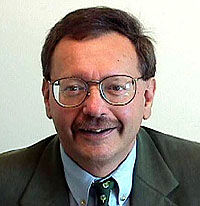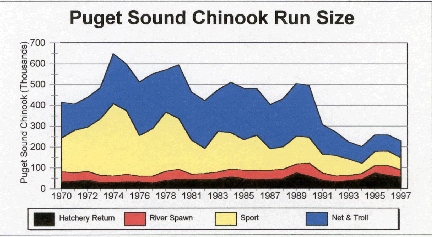Click Here To Get Your Site Sponsored!
Click Here To Get Your Site Sponsored!
News from the Front #28:
Enemies of the Salmon Revolution: Dr. Koenings' War on Washington

Meet Dr. Jeff P. Koenings, Director of Washington's Department of Fish and Wildlife. Why do I single out Dr. Koenings for special attention? Happenstance, really. He's no worse than an army of other fish bureaucrats extending their empires at the expense of Northwest citizens. But his handiwork happens to have crossed my desk three times in the month of May.
First, on May 18, 2000, Dr. Koenings declared that Washington Department of Fish and Wildlife "believe[s] the flow targets set by NMFS in their Biological Opinions (1995 and 1998) are justified and constitute the minimum level of flow needed to protect juvenile salmon migrants" (emphasis added). In fact, these flow targets are so high that they can never be met (in summer months), even if we blew up all the dams and evacuated the Pacific Northwest. It is grossly irresponsible to assert that impossible targets are "the minimum" needed to protect fish.
Worse still, Dr. Koenings took action in the same May 18th letter to try and shut down farmers irrigating in the Columbia Basin Project in order to meet the impossible flow targets. Specifically, at his direction, the State of Washington has now demanded that "the [U.S.] Bureau [of Reclamation] initiate consultation with NMFS on the Columbia Basin Project". Dr. Koening apparently believes that the Bureau's delivery of water to the irrigation districts kills endangered fish, and that deliveries must be curtailed to help them. There are surely streams somewhere in the Columbia River Basin where low flows kill salmon, but the mighty Columbia River is not one of those streams. Making the U.S. Bureau of Reclamation take less water out of the Columbia will not accomplish squat for salmon.
An official purporting to represent the sovereign authority of the State of Washington ought not to be turning the Feds loose on Washington's own citizens. That is especially true since the people of Washington made it clear in 1984, by Initiative 456 (now codified in RCW 75.56.30), that management of natural resources, including fisheries, "are responsibilities of the state of Washington and shall remain within the express domain of the state of Washington" and that "all resources in the state's domain shall be managed by the state alone". This law, ignored by those sworn to uphold Washington's laws, imparts an affirmative duty on Washington's officials to minimize federal involvement in the management of Washington's natural resources.
If Dr. Koenings really believed that Columbia Basin irrigators were killing fish of any importance to the State of Washington, he could use the sovereign authority of the State of Washington to haul the irrigators into Washington courts. But, of course, there aren't any dead fish to parade in front of a judge and jury. And so Dr. Koenings and his ilk skulk off to the federal bureaucracies willing to issue sweeping rulings without need of facts. Strike one, Dr. Koenings.
Second, on May 18, 2000, Dr. Koenings travelled to Congress to beg for money to help implement the federal Endangered Species Act. In his testimony (available online), rather than point out that the listings are illegitimate, as there is no appreciable risk of extinction for most of the "Evolutionarily-Significant Units" NMFS has listed, Dr. Koenings takes the opposite approach. "Consider the Puget Sound chinook", he says. "A little over a year ago, the National Marine Fisheries Service listed the chinook as threatened. At the turn of the century, nearly 700,000 of these remarkable fish annually returned to the cold, clear, clean water of Puget Sound. Today, however, their number has dwindled to fewer that 18,000." That is at best a gross misrepresentation.
S.P. Cramer & Associates recently demonstrated in a comprehensive review of Puget Sound salmon (available online) that run sizes have stayed high for decades, and the number of wild spawners (red) has changed very little over 30 years of human development:

Cramer points out harvest exploitation rates "ranged from 60% to 80% on Puget Sound chinook during the early 1980s, and only declined to 40% to 60% on most stocks by 1995 and 1996, despite greater reductions in marine survival". In other words, it's the same old story. Fishery managers allow fishermen to run amok, despite dramatic declines in ocean conditions, add a liberal dose of hatchery mismanagement, and then blame the resulting soup on degradation of freshwater habitat. Strike two, Dr. Koenings.
Third, on May 31, 2000, Dr. Koenings wrote to the Regional Director of NMFS in an ultimately successful effort to shut down critical scientific research on the survival of Snake River fall chinook salmon. As solid data has emerged showing that flow augmentation provides no measurable benefits to Snake River spring/summer chinook salmon, and that transportation offers survival benefits that dwarf any effects of dam breaching, Snake River fall chinook salmon have become prime fodder for fishery agency lies.
This year, NMFS researchers wanted to put tags in roughly 75,000 Lyons Ferry Hatchery fall chinook and get competent measurements of survival and transportation benefits. Dr. Koening sprang into action, warning that it "would be chaotic" if "the various fishery agencies in the [Columbia River] Basin conduct[ed] their enhancement or research activities unilaterally". Scientific advances come from the freedom of independent researchers to pursue inherently chaotic trails through data, not from communist-style central planning in which we shut down research if the results are likely to offend any one of dozens of government agencies.
Dr. Koenings' excuse was not the likely offensiveness of the results (dams don't kill many fall chinook, and transportation helps). Rather, he claimed that "the NMFS original study design resulted in putting in-river migrating fish through the turbines at collector projects, which was unacceptable to all the other salmon managers". NMFS was, of course, trying to measure the effects of the turbines and other in-river mortality as compared to transportation. But Dr. Koenings and his allies want to kill fish by spilling at the collector projects, where increased spill means that fewer fish are transported. It's not about the fish. Strike three, Dr. Koenings.
To be fair, final credit for spiking the research belongs to the Nez Perce Tribe; rumor has it Dr. Koenings backed down before the federal overlords once it was clear that the Tribe would carry the ball.
© James Buchal, June 23, 2000
You have permission to reprint this article, and are encouraged to do so. The sooner people figure out what's going on, the quicker we'll have more fish in the rivers.
![]()
Return to Other Salmon Materials
Return to www.buchal.com